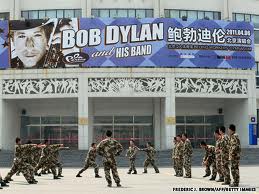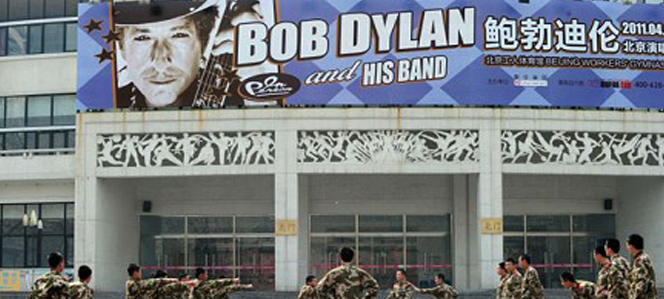Bob Dylan in China
By Rev. Robert Barron
 Knowing my interest in all things Bob Dylan, a friend sent me an article recently penned by Maureen Dowd, columnist for the New York Times. It had to do with the maestro’s recent (and unprecedented) appearance in China, but it was far from an encomium. Dowd took Bob Dylan sharply to task for caving in to the Communist authorities, apparently agreeing to their demands not to sing any of his best-known anti-war and counter-cultural anthems from the sixties: “Blowin’ in the Wind,” “A Hard Rain’s Gonna Fall,” “The Times They Are A-Changin’,” etc. How unlike the courageous young Dylan, she opined, who walked off the Ed Sullivan Show when the censors told him he couldn’t sing “Talkin’ John Birch Society Blues,” a rather biting satire of the right-wing extremist group. Then again, she went on, didn’t Dylan himself, in his much-lauded autobiography Chronicles Vol. I, not admit that he was never much for the sixties counter-culture and that he never sought to be the voice of a generation? Wasn’t this latest episode not just one more indication that the “real” Dylan was but a conventional entertainer, willing to go along with anyone or adopt any style in order to make money?
Knowing my interest in all things Bob Dylan, a friend sent me an article recently penned by Maureen Dowd, columnist for the New York Times. It had to do with the maestro’s recent (and unprecedented) appearance in China, but it was far from an encomium. Dowd took Bob Dylan sharply to task for caving in to the Communist authorities, apparently agreeing to their demands not to sing any of his best-known anti-war and counter-cultural anthems from the sixties: “Blowin’ in the Wind,” “A Hard Rain’s Gonna Fall,” “The Times They Are A-Changin’,” etc. How unlike the courageous young Dylan, she opined, who walked off the Ed Sullivan Show when the censors told him he couldn’t sing “Talkin’ John Birch Society Blues,” a rather biting satire of the right-wing extremist group. Then again, she went on, didn’t Dylan himself, in his much-lauded autobiography Chronicles Vol. I, not admit that he was never much for the sixties counter-culture and that he never sought to be the voice of a generation? Wasn’t this latest episode not just one more indication that the “real” Dylan was but a conventional entertainer, willing to go along with anyone or adopt any style in order to make money?
Well, it’s never pleasant to see one of your heroes raked over the coals. My interest piqued and my dander up, I went to one of my favorite websites, BobLinks, which features set-lists of every concert as well as amateur reviews by concert-attendees, in order to see what Dylan actually played in China. Dowd was right in saying that Dylan did not play any of his classic “protest” songs, and for all I know he might have agreed with the Communist government not to play them. But the second I saw how he led off each concert, I laughed out loud, for I realized that Dowd had totally missed just how radical Bob Dylan was in China, indeed far more revolutionary than he would have been had he played his four thousandth version of “Blowin’ in the Wind.”
At each of his Chinese concerts, Dylan opened with a song from his explicitly Christian period from the late seventies and early eighties. The first night, in Shanghai, he commenced the show with “Gotta Serve Somebody,” a 1979 number that won Dylan a Grammy for best song. It is based on a passage from the 24th chapter of the book of Joshua. After the Israelites had completed their conquest of the Promised Land, Joshua assembled the people and posed to them a blunt choice: either you worship the Lord or you worship the gods of the people you have conquered. Then he says, unambiguously, “…as for me and my household, we will serve the Lord” (Josh. 24: 16). Dylan translates this into his distinctive poetry: “You might be the ambassador to England or France/ You might like to gamble, you might like to dance/ You might be the heavyweight champion of the world/ You might be a socialite with a long string of pearls/ but you’re gonna have to serve somebody/ It might be the devil or it might be the Lord/ But you’re gonna have to serve somebody.” There it is, as stark as Joshua’s challenge: either the true God or the dark power that lies behind all false claimants to ultimacy. To sing those lines in a country which has been, from the time of Mao-Tse-Tung, officially atheist, which has actively persecuted the Christian churches, putting uncounted thousands of Christians to death and throwing still more into prison—well, I don’t know, Ms. Dowd, but that’s pretty revolutionary in my book.
And in Beijing the next night, Dylan opened his concert with another song from his first Christian album, a sprightly little number called “Gonna Change My Way of Thinkin’.” The next to last stanza of that blues tune is this: “Jesus said be ready, You know not the hour which I come/ Jesus said be ready, You know not the hour which I come/ He said, ‘He who is not for me is against me’/ Just so you’d know where he was comin’ from.” To sing those lines in a country where absolute authority has been claimed by an oppressive state, which has been willing to murder scores of millions of people who stood in its way: for my money, that’s about as counter-cultural, challenging, subversive, and revolutionary as you can get.
Anyone that knows the work of Bob Dylan knows that the songwriter has been deeply religious his career long. His explicitly political protest songs were rooted in the prophetic tradition of ancient Israel and almost without exception called the judgment of God on wicked rulers and unscrupulous financiers. What was that “hard rain a-gonna fall” if not the flood of Noah? And what was that “wind” in which the answers were blowin’ if not the Holy Spirit? In his Christian period, all of this became explicit and straightforward—and it was with two of these Christian songs that he decided to challenge Chinese society. In doing so, he was standing with St. Paul, who dared to speak of “Jesus the Lord” in a society where “Caesar is Lord” was a signal of one’s loyalty to the power structure.
Pace Maureen Dowd, the Bob Dylan who decided to proclaim, with the full blast of a rock band, the Lordship of Jesus Christ in Communist China has never been more truly revolutionary.
